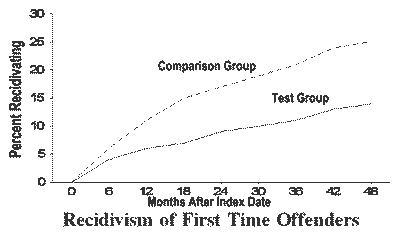















Traffic Tech #193: Individualized Sanctions for DWI Offenders Reduce Recidivism |
|---|
|

INDIVIDUALIZED SANCTIONS FOR DWI OFFENDERS REDUCE RECIDIVISM
Each year more than 1.4 million drivers are arrested for DWI (driving while intoxicated) in America. Traditionally, sanctions have included fines, jail time, and license suspension. In recent years, alternative sanctions have been added. These sanctions include ignition interlocks, home detention with electronic monitoring, intensive probation supervision, vehicle impoundment and forfeiture, alcohol treatment, and community service.
The National Highway Traffic Safety Administration (NHTSA) continues to examine the effectiveness of various sanctions for DWI offenders (see Traffic Techs 130, 150, and 180). One finding from this research is the need for close and consistent contact between the sanctioning agents (judge and probation officer) and the offender.
A new study by Mid-America Research Institute documents the effectiveness of a sanctioning program that used a combination of both traditional and alternative sanctions to deal with the needs of the individual offender.
Beginning in 1992, Judge William F. Todd, Jr., of the State Court of Rockdale County, Georgia, sentenced DWI offenders in his courtroom to individualized sanctioning programs. The concept of individualized sanctions is not new, nor is the practice of the concept unique to Judge Todd's court. However, his range of sentencing options is much wider than available in most jurisdictions, and second, the judge does his own pre-sentence investigation using a database that he developed and maintains. To date, Judge Todd's database contains records on more than 1,800 offenders.
In Rockdale County, every DWI offender who goes before Judge Todd receives a customized sentence. A first offender, with no evidence of a drinking problem, might be sentenced to two days in jail, a fine, and attendance in DWI school. A repeat offender, on the other hand, with a drinking problem, would receive a longer jail sentence, and a heavier fine. Such an offender also would be required to participate in a treatment program, submit to daily breath-alcohol testing, and undergo close supervision by a probation officer.

In this study, the recidivism rate of 869 DWI offenders who saw Judge Todd was compared to the recidivism rate of 637 offenders in a nearby, similar jurisdiction, where typically only the minimum sanctions required by law are imposed on offenders.
Of Judge Todd's 869 offenders, 48.6 percent were between the ages of 21 and 34, and half had at least one prior DWI conviction. All of the 869 offenders received some jail time, with 38 percent receiving more than 10 days. Forty-four percent were required to attend Alcoholics Anonymous meetings, and 20 percent were placed on house arrest, with half of these under electronic monitoring. Forty-eight percent were also required to provide periodic breath alcohol tests.
After one year, only 6 percent of the first offenders in Judge Todd's court had committed a repeat offense, compared to 11 percent in the neighboring jurisdiction, a statistically significant difference. After four years, the recidivism rate in Judge Todd's group was 13.8 percent compared to 24.7 percent in the other jurisdiction. Although slightly higher, the rates for offenders with previous DWIs followed the same trend.
The resources required for the court component of an individualized sanctioning program do not appear to be any greater than for a court that imposes minimum sentences. However, having sanctioning options available and the commitment of the judiciary are necessary.
Conclusions
Although it was not possible to separate and examine the effects of each sanctioning component, the results from this study indicate that a customized sanctioning program, tailored to the individual DWI offender, can be more effective than imposing only minimum sanctions. This type of sanctioning approach can be used in jurisdictions across the country, where there is strong community and judicial support for combating impaired driving.
HOW TO ORDER
For a copy of Individualized Sanctions for DWI Offenders write to the Office of Research and Traffic Records, NHTSA, NTS-31, 400 Seventh Street, SW, Washington, DC, 20590; or send a fax to (202) 366-7096; or download from http://www.nhtsa.dot.gov/people/alcohol. Amy Berning was the contract manager for this project.
U.S. Department
of Transportation
National Highway
Traffic Safety
Administration
400 Seventh Street, S.W. NTS-31
Washington, DC 20590
Traffic Tech is a publication to disseminate
information about traffic safety programs,
including evaluations, innovative programs,
and new publications. Feel free to copy it as you wish.
If you would like to receive a copy contact:
Linda Cosgrove, Ph.D., Editor, Evaluation Staff
Traffic Safety Programs
(202) 366-2759, fax (202) 366-7096
mailto:lcosgrove@nhtsa.dot.gov
